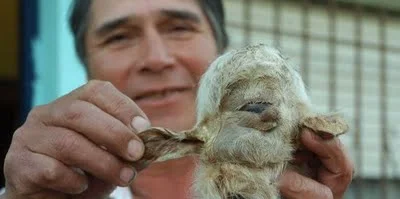While researching on Mapuche sculptures for my post on "Fake" Patagonian Plesiosaur stone carving, I came across a very interesting "two headed" man.
It is on display at the Bullock Dillman Museum in Angol, Chile.
American naturalist, Dillman Samuel Bullock Lytle (1878-1971), excavated in that part of Chile (Arauco) during the mid XXth century and uncovered funerary urns that were different to those used by the local Mapuche people (Huilliche) and whose size indicated a very small race. An adult’s mummy, five hundred years old recently found in Angol was barely 1,30 m tall (4.2 ft.).[1]
These findings led Bullock to believe that the Mapuche were not the area’s original inhabitants. He assumed that they had originated in the Argentine Pampas and then migrated into Chile. When they arrived there they came across a race of “small people”, which he named Kofkeche. Perhaps the two-headed statue was made by the Kofkeche instead of the Mapuche? I do not know.
Below is an image of the statue:
Detail of "Museo Naturalista Dillman Bullock, Angol". Copyright ©katyta.liraz.[2]
This statue (which may be two people hugging instead of a bicephalic person) reminded me of something that I had read and discarded as a hoax. But now it seems interesting so, let me share it with you.
The article which was published in the ForteanTimes as "The two-headed giant" [3] tells about a giant Patagon with two heads that was captured by the Spaniards in the late 1600s. He killed himself after murdering four of his captors.
He was 3.7 m tall [12 ft.] and, was known as kap dwa which is Malay for "two heads". Why a Patagon ended up with a Malaysian name is a mystery. Somehow he arrived in England in the 1800s and was a fairground attraction since then.
In the 1930s, two doctors and a radiologist inspected it in Weston and found “no perceptual evidence of its being a fake”. Their guess was that the man was a pair of conjoined twins (i.e. "Siamese twins").
He was last seen at Newcastle in 1999. Fake or hoax? that is not known.[3]
The article that I reviewed, included some photographs, one of which I reproduce below (and which seems to depict an African and not a Patagon):
Two Headed Patagon Giant. From [3]. See Footnote [*]
There is another virtually identical mummified Patagon (or was it the same one?), "King Mac-A-Dula", he was " nine feet high, had two heads, was as strong as an elephant, and a great warrior who led his tribe to many victories, and that after one great battle he disappeared and was never seen or heard of again".
His mummy (a natural process acording to the pamphlet we are quoting) "was found in a cave in Patagonia. South America, by a party of English miners, while prospecting for gold". Apparently it was exhibited by the Nelson Supply House at South Boston, Massachusetts, U.S. It was under lease from England, so perhaps it was the same being.
It seems however that Mr. Nelson made his fake mummies out of papier-maché and sold them to anyone willing to display them.[5]
Two-headed creatures have existed as "curios" since time immemorial. See This image of some strange creatures, among which is a two-headed dwarf.
Patagonia also has myths about a condor with two heads and an enigmatic two-headed guanaco, which was a bad omen, a "forerunner of sickness"[6].
Bibliography.
[1] Aburto, M., (2005). Vaca arqueóloga. Encontró esqueleto humano de más de 500 años en Angol. Las Últimas Noticias. Santiago, Chile. 27.06.2005.
[2] Katyta.liraz. Flickr posting. 01.10.2008 Museo Naturalista Dillman Bullock, Angol.
[3] Fortean Times. The Two-Headed Giant.
[4] Sideshow World. Special Attraction King Mac-A-Dula. The Two-Headed Patagonian Giant. Lecture on the Two-headed Giant.
[5] Show History. The Nelson Supply House.
[6] Musters, C. (1873). At home with the Patagonians: a year's wanderings over untrodden ground from the straits of Magellan to the Rio Negro. J. Murray. pp.192.
[*] Footnote.
Legal stuff:
Regarding Copyright of third parties, please see my FAIR USE NOTICE (items 13.a and 13.b) at our Terms and Conditions page. Thank you.
Copyright 2009 by Austin Whittall ©
Patagonian Monsters






































